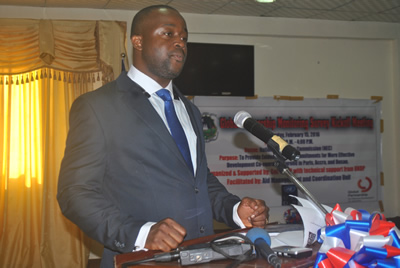 Monrovia, Liberia- The Government of Liberia through the Ministry of Finance and Development Planning (MFDP)’s Aid Management and Coordination Unit, with technical support from the United Nations Development Programme (UNDP), today hosted a multi-stakeholders’ consultation intended to increase effectiveness in aid management nationwide.
Monrovia, Liberia- The Government of Liberia through the Ministry of Finance and Development Planning (MFDP)’s Aid Management and Coordination Unit, with technical support from the United Nations Development Programme (UNDP), today hosted a multi-stakeholders’ consultation intended to increase effectiveness in aid management nationwide.
According to the conference organizers, it was meant to review and discuss a monitoring guide 2015-2016 developed to advance Global Partnership for Effective Development Co-operation (EDC) which was established as a result of the Paris, France and Busan, South Korea declarations on aid effective management.
The consultation brought together about 60 participants including resource persons from line ministries, agencies, and commissions, as well as, representatives from the National Legislature, providers of development co-operation, civil society organizations, private sector and trade union in the country was held at the National Elections Commission.
The meeting geared toward facilitating data collection and validation process as well as ensures an inclusive approach of all relevant stakeholders from both the public and private sectors.
“The meeting is an opportunity to raise awareness on the monitoring process, agree on which stakeholders should be involved, and agreed on a timeline, as well as the roles and responsibilities of each stakeholder, Mr. Frederick B. Krah, MFDP’s Director of Aid Management and Coordination Unit told the participants while giving an overview of the consultation.
He said the Global Partnership monitoring guide/framework comprised of 10 indicators with focus on strengthening developing country institutions, increasing transparency and accountability of development co-operation, enhancing gender equality, and others developmental initiatives.
Mr. Krah further stated that the monitoring exercise will help provide evidence on progresses, opportunities and obstacles in the implementation of effective development co-operation commitments in supporting mutual accountability and stimulate and/or inform multi-stakeholder decisions at country, regional and global levels on how to make development co-operation more effective, as inculcated in the Addis Ababa Action Agenda which aims at improving the quality, impact and effectiveness of development co-operation to help ensure the Sustainable Development Goals are achieved.
“This process is good and I encouraged your full participation. This process will last up to March 31, when data collected will be submitted to the UNDP-OECD Joint Support Team for analysis and aggregation into a global progress report 2016. The findings from the monitoring exercise will be ultimately used to inform political dialogue at country, regional and global levels. In particular, the 2016 progress report will provide a key source of evidence at the second Ministerial meeting of the Global Partnership which is expected to be held in November, this year,” the MFDP’s Director of Aid Management and Coordination Unit maintained.